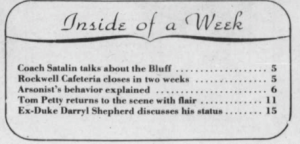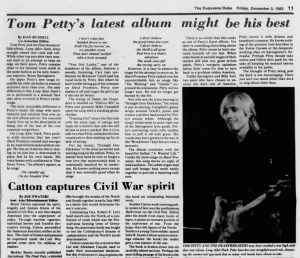Tom Petty's latest album might be his best
By Dan Russell
The Duquesne Duke - Friday, December 3, 1982
Tom Petty returns to the scene with flair.
Tom Petty and the Heartbreakers' fifth album, Long After Dark, dives staight ahead into rock and roll. While other top acts alter their musical style in an attempt to keep an edge on their peers, Petty remains close to his musical roots much as the same fashion as his only American superior, Bruce Springsteen.
On paper Petty's new songs resemble his older melodies in musical structure more than ever. The only different is that Long After Dark's set is performed in a musical flare that never evolved in Petty's earlier songs.
The most noticable difference is Pettys vocals. He sings with more intensity and emotion than ever on the new album and for this reason he finally lives up to the description of being one of the last of the true romantic songwriters.
On Long After Dark, Petty pushes aside anxieties that last year's Hard Promises created and emerges as an experienced and confident singer. He sees an America that is closing in on him but is determined to place fate in his own hands. His voice beams with confidence in "One Story Town," the album's opener, as he sings:
I'm standin' up,
I'm for breakin' free
I don't want fate
handed down to me
Yeah I'm for movin' on,
try another town
Time ain't chainin' nothin'
take a look around.
"You Got Lucky," one of the standouts of the album, features a moody, bouncing, Cars type synthesizer by Benmont Tench and top vocal form by Petty. But where he had trouble letting go of his romance on Hard Promises, Petty now shakes it off and urges the girl to go if she can do better.
The energy of Damn the Torpedoes is recalled on "Deliver Me" as Petty and guitarist Mike Campbell open the song with a crashing guitar rhythm.
"Finding Out" closes the first side with the same type of energy and leads on to believe that side two will be just as power packed. But it is on side two that Petty unleashes his best vocalwork to date, making up for its lack of energy.
For my money, "Straight Into Darkness" is the most powerful and moving song on the album. Petty, no matter how hard he tries to forget a true love that mysteriously died, is continually haunted by its memories. He knows nothing more xcept that it was naturally good when he sings:
I don't believe
The good times are over,
I don't believe
the trill is all gone
Real love is a man's
salvation
The weak ones fall
The strong carry on
However, it is easy to admire the singer for his attempt to move on. In Hard Promises Petty sulked over his uncontrollable fate as songs like "The Waing" and "Insider" expressed his uneasiness. Petty will no longer wait. He will no longer get burned by the fire.
Not only are the lyrics moving in "Straight Into Darkness," the music is just as stirring. Campbell's guitar wraps around Tench's piano and creates a perfect background for Petty's unique whine. Although the song's words seem to come right out of the Springsteen lyric guide, Petty's convincing vocal style enables him to pull it off with grace. His vocals may have gotten in the way in the "Breakdown" days but are now a necessity.
The album concludes with the beautiful ballad, "A Wasted Life." Unlike the slow songs on Hard Promises, this song shows no signs of awkwardness. The subtle organ lead and soft bongo beat mesh neatly together to provide a haunting stillness.
There is no doubt that this ranks as one of Petty's finest efforts. Yet there is something disturbing about the album. Petty seems to have matured lyrically all too fast. When other bands ar parallel stages of their careerts still lack any great lyrical depth, Petty's energetic optimism leaves little room for him to turn back to a problem ridden America.
Unlike Springsteen and Billy Joel, two peers who have chosen to uncover this dark side of America, Petty covers it with dreams and kamikaze romances. He knows nothing of the pressure Joel describes in the Nylon Curtain or the desperate working class on Springsteen's Nebraska. Perhaps Petty should take notice and follow their path for the sake of keeping his musical talents available to the public.
The thought of Petty being past the dark is not encouraging. There just isn't too much other than dark to sing about these days.


